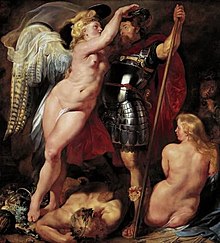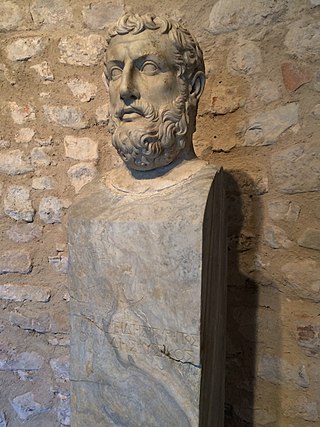
Parmenides of Elea was a pre-Socratic Greek philosopher from Elea in Magna Graecia.
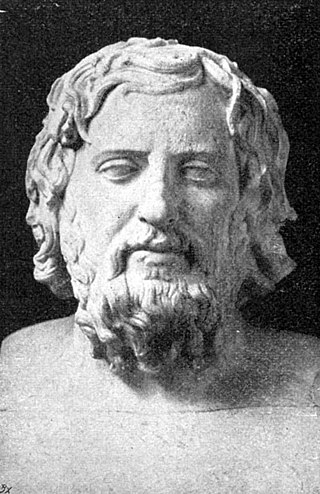
Xenophon of Athens was a Greek military leader, philosopher, and historian, born in Athens. At the age of 30, Xenophon was elected commander of one of the biggest Greek mercenary armies of the Achaemenid Empire, the Ten Thousand, that marched on and came close to capturing Babylon in 401 BC. As the military historian Theodore Ayrault Dodge wrote, "the centuries since have devised nothing to surpass the genius of this warrior". Xenophon established precedents for many logistical operations, and was among the first to describe strategic flanking maneuvers and feints in combat.
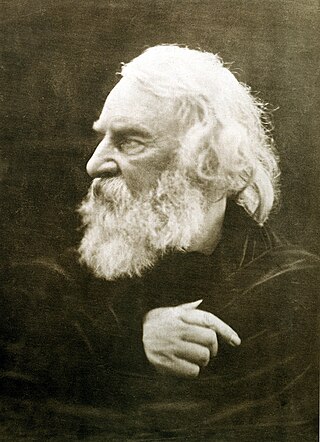
Henry Wadsworth Longfellow was an American poet and educator. His original works include the poems "Paul Revere's Ride", "The Song of Hiawatha", and "Evangeline". He was the first American to completely translate Dante Alighieri's Divine Comedy and was one of the fireside poets from New England.

In Greek mythology, Eteocles was a king of Thebes, the son of Oedipus and either Jocasta or Euryganeia. Oedipus killed his father Laius and married his mother without knowing his relationship to either. When the relationship was revealed, he was expelled from Thebes. The rule passed to his sons Eteocles and Polynices. However, because of a curse from their father, the two brothers did not share the rule peacefully and died as a result, ultimately killing each other in battle for control of the city. Upon his death, Eteocles was succeeded by his uncle, Creon.

In Greek mythology, Patroclus was a Greek hero of the Trojan War and an important character in Homer's Iliad. Born in Opus, Patroclus was the son of the Argonaut Menoetius. When he was a child, he was exiled from his hometown and was adopted by Peleus, king of Phthia. There, he was raised alongside Peleus' son, Achilles, of whom he was a childhood friend and close wartime companion. When the tide of the war turned against the Achaeans, Patroclus, disguised as Achilles and defying his orders to retreat in time, led the Myrmidons in battle against the Trojans and was eventually killed by the Trojan prince, Hector. Enraged by Patroclus' death, Achilles ended his refusal to fight, resulting in significant Greek victories.

An elegy is a poem of serious reflection, and in English literature usually a lament for the dead. However, according to The Oxford Handbook of the Elegy, "for all of its pervasiveness ... the 'elegy' remains remarkably ill defined: sometimes used as a catch-all to denominate texts of a somber or pessimistic tone, sometimes as a marker for textual monumentalizing, and sometimes strictly as a sign of a lament for the dead".
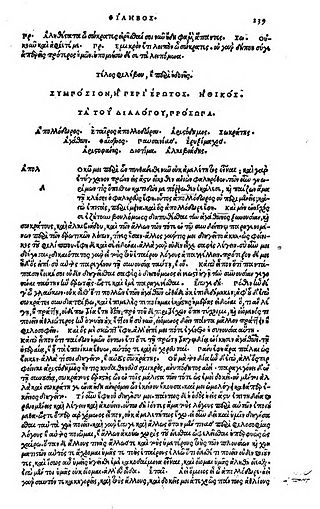
The Symposium is a Socratic dialogue by Plato, dated c. 385 – 370 BC. It depicts a friendly contest of extemporaneous speeches given by a group of notable Athenian men attending a banquet. The men include the philosopher Socrates, the general and statesman Alcibiades, and the comic playwright Aristophanes. The panegyrics are to be given in praise of Eros, the god of love and sex.

The Ancient Greek: δαίμων, pronounced daimon or daemon, originally referred to a lesser deity or guiding spirit such as the daimons of ancient Greek religion and mythology and of later Hellenistic religion and philosophy. The word is derived from Proto-Indo-European daimon "provider, divider ," from the root *da- "to divide". Daimons were possibly seen as the souls of men of the golden age acting as tutelary deities, according to entry δαίμων at Liddell & Scott. See also daimonic: a religious, philosophical, literary and psychological concept.

Jorge Manrique was a major Castilian poet, whose main work, the Coplas por la muerte de su padre , is still read today. He was a supporter of the queen Isabel I of Castile, and actively participated on her side in the civil war that broke out against her half-brother, Enrique IV, when the latter attempted to make his daughter, Juana, crown princess. Jorge died in 1479 during an attempt to take the castle of Garcimuñoz, defended by the Marquis of Villena, after Isabel gained the crown.

Arete is a concept in ancient Greek thought that, in its most basic sense, refers to "excellence" of any kind—especially a person or thing's "full realization of potential or inherent function." The term may also refer to excellence in "moral virtue."

Eros is a concept in ancient Greek philosophy referring to sensual or passionate love, from which the term erotic is derived. Eros has also been used in philosophy and psychology in a much wider sense, almost as an equivalent to "life energy". The Protestant philosopher C. S. Lewis posits it as one of the four ancient Greek words for love in Christianity, alongside storge, philia, and agape.
Phædo or Phaedo, also known to ancient readers as On The Soul, is one of the best-known dialogues of Plato's middle period, along with the Republic and the Symposium. The philosophical subject of the dialogue is the immortality of the soul. It is set in the last hours prior to the death of Socrates, and is Plato's fourth and last dialogue to detail the philosopher's final days, following Euthyphro, Apology, and Crito.
Kleos is the Greek word often translated to "renown", or "glory". It is related to the English word "loud" and carries the implied meaning of "what others hear about you". A Greek hero earns kleos through accomplishing great deeds.

Gómez Manrique y de Castilla was a Spanish poet, soldier, politician and dramatist.
Greek love is a term originally used by classicists to describe the primarily homoerotic customs, practices, and attitudes of the ancient Greeks. It was frequently used as a euphemism for both homosexuality and pederasty. The phrase is a product of the enormous impact of the reception of classical Greek culture on historical attitudes toward sexuality, and its influence on art and various intellectual movements.
'Greece' as the historical memory of a treasured past was romanticised and idealised as a time and a culture when love between males was not only tolerated but actually encouraged, and expressed as the high ideal of same-sex camaraderie. ... If tolerance and approval of male homosexuality had happened once—and in a culture so much admired and imitated by the eighteenth and nineteenth centuries—might it not be possible to replicate in modernity the antique homeland of the non-heteronormative?
La Saga, Negocio de Familia was a popular Colombian soap opera aired in 2004 by Caracol TV and then after 2006 aired on GenTV in South Florida. The show follows the history of the Manrique family, which was prominent in the underworld of Bogotá, Colombia. This telenovela is characterized by an unconventional plot: unlike many others, it is not a love story, but several stories of events that occur through five generations of the same family. Moreover, there is no humor and the plot is marked by death, suffering and crime. It received the "Best Telenovela" award at the Colombian Television Awards in 2005.

The Iliad is one of two major ancient Greek epic poems attributed to Homer. It is one of the oldest extant works of literature still widely read by modern audiences. As with the Odyssey, the poem is divided into 24 books and was written in dactylic hexameter. It contains 15,693 lines in its most widely accepted version. Set towards the end of the Trojan War, a ten-year siege of the city of Troy by a coalition of Mycenaean Greek states, the poem depicts significant events in the siege's final weeks. In particular, it depicts a fierce quarrel between King Agamemnon and a celebrated warrior, Achilles. It is a central part of the Epic Cycle. The Iliad is often regarded as the first substantial piece of European literature.
Nationality words link to articles with information on the nation's poetry or literature.

Rodrigo Manrique de Lara was a rebellious Spanish noble who gained notoriety for his prowess in the Reconquista battles against the Muslim invaders. He sided with the Infantes of Aragon during their war against John II of Castile and Álvaro de Luna. He held the title of the first Count of Paredes de Nava and was the Grand Master of the Order of Santiago for the Kingdom of Castile.
